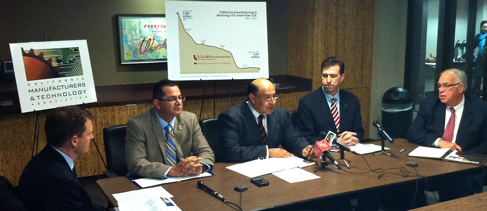In 2003 California manufacturers lost a sales tax credit on their capital equipment purchases, making them approximately six percent less competitive than manufacturers in most other states. Since then, there have been no less than 20 proposed exemptions in different forms before our state legislature. None have made it to even a second committee hearing.
The annual proposals indicate that some legislators, like those in most states, understand the importance of competitive tax policy for manufacturers — and the jobs, innovation and ripple effect they bring to a regional economy. Unfortunately the proposals stumble every year on an unwarranted fear of lost state revenues.
This year, after a decade of bipartisan support, that might change.
Yesterday, Senator Lou Correa and Assemblyman Kevin Mullin held a press conference at CMTA’s office to announce new legislation to provide a sales tax exemption designed to stimulate our manufacturing base.
CMTA president Jack Stewart summed it up with clarity at the press conference, “By creating a sales tax exemption for manufacturing equipment, California sends a strong signal to investors around the United States and around the world that California is serious about attracting new investment.”
Competitive state tax policy is absolutely critical for California to attract domestic manufacturing investment.
California is the largest manufacturing state, but our state has been among the lowest performing states in per capita manufacturing investment in the last decade.
There are many reasons for this, but the state’s total valuation of costs makes it very difficult to compete for new manufacturing start-ups and expansions.
Advanced manufacturing equipment is expensive, often resulting in millions of dollars per year in new equipment or retrofits for a company. A six percent tax disadvantage on these critical inputs means less investment and fewer middle-class jobs for California. Often this doesn’t result in companies moving out of state, but means a company quietly elects to grow elsewhere.
Some folks think the exemption equates to less revenue for the state. The opposite is true. A study done by the Milken Institute on a similar exemption showed that after the first three years of the policy, the state would reap more than 45,000 jobs and bring in more than $500 million in new state revenues with a net increase of $39 million to the state. Senator Correa’s legislation delays a company’s ability to recognize the tax savings for the first three years, allowing the state to reap the revenue benefits before paying for the exemption.
The legislation is more popular than ever with co-authors from both parties jumping on board. There is no reason our legislature shouldn’t fully embrace this concept when so many other states already do.


